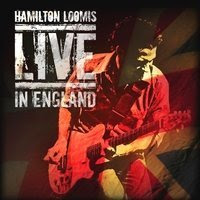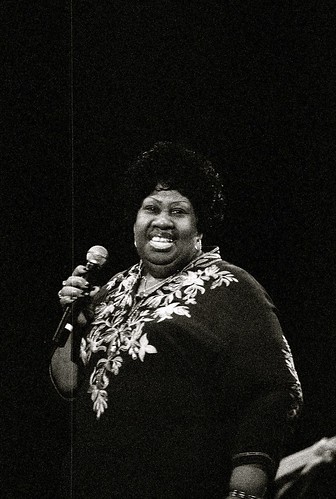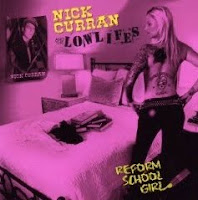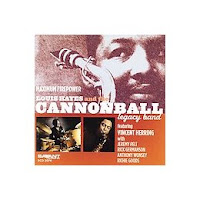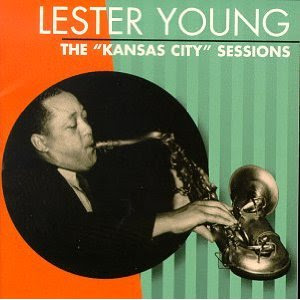 The introduction of the compact disc had a definite benefit in allowing the reissue of vintage jazz and blues material, including much that had never been reissued on vinyl LPs. Back in June 1997, Jazz & Blues Report, issue 222, ran my review of several reissues of material from the legendary Commodore label. Amazon does show some of these as still available.
The introduction of the compact disc had a definite benefit in allowing the reissue of vintage jazz and blues material, including much that had never been reissued on vinyl LPs. Back in June 1997, Jazz & Blues Report, issue 222, ran my review of several reissues of material from the legendary Commodore label. Amazon does show some of these as still available.GRP Records recently acquired the Commodore label catalog of classic jazz recordings from the thirties and forties. Founded by Milt Gabler, owner of the Commodore Record Store, and later an important figure at Decca Records, it was among the most important of the early jazz independent labels that started to flourish during the swing era. GRP has launched an important series of reissues from the label with a collection celebrating Commodore, along with five albums devoted to artists.
The Commodore Story (CMD-2-400) is a double disc survey of the label which presents an overview of many of the artists represented on the label. It opens with a segment called Commodore Highlights, with six selections starting with Eddie Condon’s Chicago style jazz group on a rousing
Love is Just Around the Corner, and Billie Holiday’s famous reading of Abel Meeropool’s powerful protest song,
Strange Fruit. The remainder of the first disc is broken into segments -
A Handful of Stars; A Handful of Guest Stars, and
Revival and Reminiscence; while the second disc has segments devoted to
Trumpets (and Cornets); Trombones; Reeds; and
Pianists. It would take far too much space to list all of the performers, much less discuss all of the music, but highlights include Lester Young on Way Down Yonder in New Orleans, a rare sample of his clarinet playing, Roy Eldridge with Chu Berry on a take of
Body and Soul that predates Coleman Hawkins’ classic recording, Jelly Roll Morton’s solo rendition of
Mamie’s Blues, Bunk Johnson’s
Franklin Street Blues, an early recording in the New Orleans revival, Will Bill Davison’s
That’s a Plenty, the unique clarinet styling of Pee Wee Russell on
Keeping Out of Mischief, Art Hodes’ wonderful blues piano solo,
A Selection From the Gutter and Willie ‘the Lion’ Smith’s accurately entitled masterwork of stride piano,
Finger Buster. This is a terrific sampler of the breadth of the Commodore catalog which is centered mostly on pre-bebop styles of jazz.
Billie Holiday came to Commodore after Columbia refused to record her singing the topical
Strange Fruit in 1939. Commodore allowed her to do a four song session which included that song, the ballad
Yesterday, her blues
Fine and Mellow, and
I Got a Right to Sing the Blues. After Columbia dropped Holiday, she returned to Commodore in 1944 with pianist Eddie Heywood for three sessions. Commodore’s Milt Gabler would soon produce more Holiday for Decca which would involve a shift from the swing combos that predominated on her many recordings. Holiday only recorded sixteen songs for Commodore, and these are presented with a a number of alternates for several titles on
The Complete Commodore Recordings (CMD-2-401). Given the number of alternates (Only
Fine and Mellow and
On the Sunny Side of the Street are heard by single recordings), the chronological presentation of the material (alternates and all) does not serve a casual listener well. Holiday remains the jazz vocalist supreme, phrasing her vocals like a Louis Armstrong trumpet solo (to cite Tony Bennett and others). However, the studio bands anchored by Eddie Heywood’s piano suffer (as do any latter Holiday) when compared to the exquisite backings of the Teddy Wilson led combos, particularly those with Lester Young. The accompaniments, particularly a series of trios, get a bit lugubrious, an effect emphasized by the sequencing of the alternate performances together. But whatever her limitations, Holiday’s ability to turn a phrase, deliver her lyrics, and project her vulnerability and hurting still haunts over fifty years after these recordings were waxed. A single disc containing all of the performances along with the best alternates would be a near essential purchase. As good as the music is here, it is more for the jazz collector as opposed to the generalist.
Lester Young had been in New York when the recordings on
The “Kansas City” Sessions (CMD-402) were made. The Kansas City refers to the Kansas City Five (or Six), the title for the small group ensembles that were recorded. After John Hammond recorded a Buck Clayton session with the Basie rhythm section with Eddie Durham’s electric guitar replacing the Count’s piano, Columbia rejected the session. Hammond brought three of the four sides to Gabler (he couldn’t find the fourth), and Gabler arranged to bring back the group, along with Lester Young, for five titles and released them as being by The Kansas City Six or The Kansas City Five (the tracks without Young). The sides with Young are particularly sublime, with Young and Buck Clayton playing with a mute for the heads before either of them or the fleet Durham would take a solo. The rhythm trio of rhythm guitarist Freddie Greene, bassist Walter Page and drummer Jo Jones define swing with their playing while Young, whether soling on tenor with a feathery, ethereal tone or a similarly velvety clarinet (as on
Countless Blues and
Pagin’ the Devil), is at the height of his melodious, lyrical, yet always earthy approach, with Clayton’s trumpet and Durham’s fleet single note guitar adding distinctive touches. Like Young’s recording debut on the Jones-Smith small group sides for Columbia, several of these recordings approach perfection, and if Freddie Greene cannot come close to his then girl friend Billie Holiday as a vocalist on
Them There Eyes, Young’s tenor break certainly elevates it. Young would lead another Kansas City Six, five and a half years later with Jo Jones returning, along with trombonist Dickie Wells trumpeter Bill Coleman, pianist Joe Bushkin and bassist John Simmons for four tunes in which Young’s tenor saxophone dominates, but Wells provides more than a few delights including’ solos on the various takes of
I Got Rhythm. Round this off with the four 1938 sides led by Buck Clayton, and you have a classic collection of small group session from swing’s heyday.
Last sessions (CMD-403) from Jelly Roll Morton collects a series of solo piano and small group recordings the pioneering jazz pianist and composer made for the General label shortly after making his famous Library of Congress Recordings (of which the music has been reissued on Rounder). By the time these were made, Morton’s career had fallen quite a bit from the days he was quite a dandy, as when he made the legendary Red Hot Pepper recordings for Victor. Constantly reminding others of his status as the creator of jazz, his solo pieces include a terrific rag, renditions of
Winin’ Boy,
Heard Buddy Bolden Say, the amusing children’s lyric on
Animule Dance and
Mamie’s Blues. Morton adds to the charm of several numbers with very amiable vocals and some commentary. The remainder of the album are small groups sessions, all of which have trumpeter Red Allen among others. If not having the precision of the Red Hot Pepper recordings (among the jazz masterpieces of the twenties), they all are spirited performances that show that even shortly before his passing, Morton could play and sing with vitality, and even have a little fun at the expense of the swing bands that had adopted his
King Porter Stomp.
Perhaps not essential Jelly Roll, but still an important collection. Wild Bill Davison’s fiery trumpet graced many a “Dixieland” record date or jam session with his full speed ahead, take no prisoners uncompromising attack.
The Commodore Master Takes (CMD-404) has the 24 sides Davison recorded as a leader in the company of such traditional jazz players as guitarist Eddie Condon, trombonist George Brunies and clarinet players Pee Wee Russell, Edmond Hall and Albert Nicholas. Many of the tracks are traditional jazz flagwavers, like
That’s a Plenty, Muskrat Ramble, Original Dixieland One Step and
High Society. The group can mute the energy level a bit for
Baby Won’t You Please Come Home and
Someday Sweetheart, while they get playful on Fats Waller’s
Squeeze Me, which sports a particularly appealing solo by Russell on clarinet in addition to Davison’s wide open horn. This is not music for the head, and some of the ensemble playing lacks some of the charm of the better New Orleans ensembles (like those of George Lewis), but this is music for the heart and the feet, and he was still blowing strong until he passed away in 1989.
Clarinet Pee Wee Russell’s Commodore collection is titled
Jazz Original (CMD-405) and accurately suggests his individuality. The Commodore recordings compiled here include several under Eddie Condon’s nominal leadership, an alternate of
Squeeze Me from a Davison session, four selections with the Three Deuces (Russell, pianist Joe Sullivan and drummer Zutty Singleton), and the closing four titles by Pee Wee Russell’s Hot Four (heard on a total of eight takes). While the backing might suggest a traditional jazz backing, he was equally at home in the company of Fats Waller, Coleman Hawkins and Red Allen, and with Allen appeared with Ornette Coleman’s rhythm section. Unlike Wild Bill Davison, Russell’s playing can’t be pigeon-holed as a traditional jazz or Dixieland. He’s too much a swing player as well as a helluva blues player, as he shows on two takes of Serenade to a Shylock which offer Jack Teagarden’s persuasive singing as well. The trio sides with Sullivan and Singleton are a particular delight, and display the melodic quality characteristic of his playing. The ensemble playing here is generally stronger than on the Davison collection, as can be heard on the spirited alternate take of a Muggsy Spanier-led rendition of
Rosetta. This album will probably be the biggest revelation for many. After all, Pres, Lady Day and Jelly Roll are among jazz’s greatest legends. Pee Wee Russell’s music may not reach the Olympian heights of their finest work, but he soars fairly high.
For purposes of FTC regulations, I was provided the review copies by Jazz & Blues Report.
 Much has been written about the late blues shouter, Jimmy Witherspoon. The Arkansas native who first attracted notice singing with with Teddy Weatherford’s Band in Calcutta which regularly broadcast over Armed Forces Radio Service, he made his first recordings with Jay McShann in 1945, recording “T'ain’t Nobody’s Business,” which became one of the biggest records of the times. With changing times, and the new rock and roll turning Witherspoon’s brand of jumping blues out of style, it was an appearance at the Monterey Jazz Festival in 1959 that returned Witherspoon to the spotlight, although now viewed in a context as a performer at jazz venues. He made a number of recordings in the contexts of jazz masters like Ben Webster, Roy Eldridge, Gerry Mulligan, and T-Bone Walker, along with a set of Kansas City jazz with Jay McShann (last reissued as a Mosaic single). Recordings with Webster were particularly wonderful but I dare say that none of his influences or contemporaries could belt out a boogie woogie as well as caress a ballad as consistently strongly as Spoon could. Then in the seventies he began an equally fruitful association with Robbin Ford that was equally fruitful, a terrific session with Panama Francis and the Savoy Sultans for Black & Blue (I downloaded this session online), and a solid JSP album with Hal “Cornbread’ Singer on sax if memory serves me right, and he made some sides with sympathetic backing from Duke Robillard and friends at the end of his career.
Much has been written about the late blues shouter, Jimmy Witherspoon. The Arkansas native who first attracted notice singing with with Teddy Weatherford’s Band in Calcutta which regularly broadcast over Armed Forces Radio Service, he made his first recordings with Jay McShann in 1945, recording “T'ain’t Nobody’s Business,” which became one of the biggest records of the times. With changing times, and the new rock and roll turning Witherspoon’s brand of jumping blues out of style, it was an appearance at the Monterey Jazz Festival in 1959 that returned Witherspoon to the spotlight, although now viewed in a context as a performer at jazz venues. He made a number of recordings in the contexts of jazz masters like Ben Webster, Roy Eldridge, Gerry Mulligan, and T-Bone Walker, along with a set of Kansas City jazz with Jay McShann (last reissued as a Mosaic single). Recordings with Webster were particularly wonderful but I dare say that none of his influences or contemporaries could belt out a boogie woogie as well as caress a ballad as consistently strongly as Spoon could. Then in the seventies he began an equally fruitful association with Robbin Ford that was equally fruitful, a terrific session with Panama Francis and the Savoy Sultans for Black & Blue (I downloaded this session online), and a solid JSP album with Hal “Cornbread’ Singer on sax if memory serves me right, and he made some sides with sympathetic backing from Duke Robillard and friends at the end of his career.


